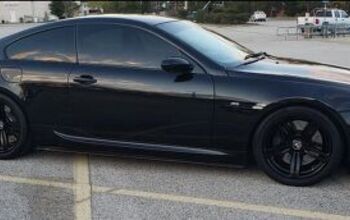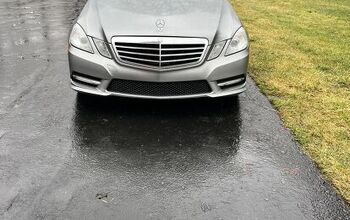China Spells Big Trouble For Japanese Automakers

The row between China and Japan over a few rocks in the East China Sea, alternately called Senkaku and Diaoyu islands, is threatening to derail production and sales plans of Japanese automakers. Many in the industry say that “Chinese consumers are unlikely to return to Japanese cars anytime soon,” as The Nikkei [sub] says. Already, Japanese automakers have curtailed production in and exports to China. The problem may not be a temporary one.
Chinese customers hold foreign brands in much higher regard than Chinese. Conspicuous consumption of foreign products is a signal of achievement. Contrary to lore that the Chinese prefer Buicks because a Chinese Emperor did so, the Chinese long preferred Japanese cars, a fact that clashes with clichés. Until recently, Japanese brands outsold all others in China, now they are in place two after being overtaken by the Germans.
That was before the Chinese riots over the rocks in the sea, that led to the smashing of Japanese-branded cars, torching of dealerships that sold them and attacks at factories that made them. Suddenly, ownership of a Japanese car means the worst of the worst in China: Loss of face.
Japanese automakers already are adjusting their output.
Toyota has decided to keep its Guangzhou plant, a joint venture with Guangzhou Auto, closed for an additional four days until it will be shut down for eight days for the October holidays, says the Nikkei. The plant makes the Camry and the Highlander. When it will reopen, the plant will go from two shifts to one.
According to the same report, Nissan will suspend production three days earlier than scheduled at three Chinese manufacturing facilities. Honda is considering going to one shift at its Guangzhou factory.
Reports by the Yomiuri Shimbun that Toyota did stop auto exports from Japan to China were discounted by a Toyota spokeswoman in Tokyo. “We are adjusting output, we did not stop it,” the spokesperson said.
While these outbursts in China tend to blow over faster than they started, market observers worry that Japanese brands have received a lasting and hurting dent in China. “When choosing between a Japanese or a German-branded car, both equal in terms of value, why would you buy a Japanese car when you see residents smashing them in such anti-Japan protests?” Song Jian, president of Tsinghua Institute for Automotive Technology, told Bloomberg. “It would definitely weigh on your buying decision.”
Koji Endo, auto analyst at Advanced Research Jaoan sees sales of Japanese brands go down by 20 to 30 percent,” Reuters reports. “The last time we had protests like this in 2010, the effects only lasted about a month, but I think this time is going to be different. This is going to have a serious impact,” Endo said. Smaller anti-Japanese protest in 2005 and 2010 were mostly for foreign consumption and either rarely noticed or mostly ignored by the Chinese population. Not so this time around.
Numerically, Nissan has the highest exposure in China with 1.25 million sales in 2011, and plans for much more in this and future years. Goldman Sachs figures that Nissan generates about 30 percent of its profit in China, compared with 17 percent at Toyota and 15 percent at Honda. Spokespeople at Nissan did not want to go on record, citing the sensitivity of the matter, but expressed hopes that business interests prevail.
Ironically, it is the Chinese government that is immediately hurt by these developments. Nearly all joint venture partners of Japanese carmakers are Chinese State-Owned Enterprises. A sudden shift in customer perception exacerbates problems with a slowing market. However, most of them have joint venture partners from other countries. In the case of Toyota, joint venture ;partner FAW is also a big partner of Volkswagen, and its Guangzhou partner signed on with Fiat. Honda’s and Nissan’s partner Dongfeng has JVs with Kia, and PSA Peugeot-Citroen. But it would not be as easy as making Volkswagens where one made Toyotas.

Bertel Schmitt comes back to journalism after taking a 35 year break in advertising and marketing. He ran and owned advertising agencies in Duesseldorf, Germany, and New York City. Volkswagen A.G. was Bertel's most important corporate account. Schmitt's advertising and marketing career touched many corners of the industry with a special focus on automotive products and services. Since 2004, he lives in Japan and China with his wife <a href="http://www.tomokoandbertel.com"> Tomoko </a>. Bertel Schmitt is a founding board member of the <a href="http://www.offshoresuperseries.com"> Offshore Super Series </a>, an American offshore powerboat racing organization. He is co-owner of the racing team Typhoon.
More by Bertel Schmitt
Latest Car Reviews
Read moreLatest Product Reviews
Read moreRecent Comments
- Jkross22 Not to rub salt in the wound, but why would you put your hq in some extraordinarily expensive real estate like Manhattan Beach? I know little of Fisker the person, but this reeks of ego and the desire for appearances.
- 3-On-The-Tree I’ve responded to several bike accidents where if the guy wasn’t wearing a helmet he would’ve been in a casket. Plus it saves your hearing.
- Wjtinfwb Nice cars and a find if you're into Radwood type iron. But a near 40 year old anything, even something as robust as a Legend is going to have failure points that would be prohibitively expensive to fix. Electronics, A/C, leaky old gaskets, creaking suspension bushing etc., not to mention the lack of safety gear and an interior that no doubt has "seen a lot". I applaud the manual transmission, but you could likely find something 30 years newer for not much more money to hone your heel and toe skills on before graduating to a more expensive ride.
- ScarecrowRepair Considering how over-priced Apple products are, I doubt a cheap Rivian is in the works.
- Dick Mottram What happens when you are on slippery pavement and AEB slams on the brakes. I see it causing many accidents in the winter!

































Comments
Join the conversation
So it was and so it shall be. The circle of life continues. They're now going through the Japan bashing phase that the US went through in the 80's. Next comes whatever the equivalent of China bashing is for the Chinese. High probability it will be the U.S.
"Even though I am American I somehow managed to read the excerpts of Ahmadinejad’s latest tirade at the UN and drawing my own conclusions was greatly, if predictably, appalled." I think Americans overestimate Ahmadinejad's actual standing in Iranian politics. He makes a lot of noise, but domestically he actually doesn't have as much clout as one might think. The real power in Iran lies with the mullahs (ayatollahs). Also, he isn't all that popular; in the last election, his re-election victory was widely believed to be rigged and there were violent protests all over the results of the elections that had to be put down with police action. Ahmadinejad isn't running again, so he will pass from the scene soon.